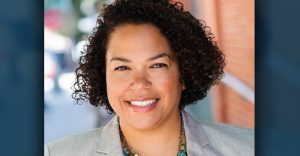#NNPA BlackPress
The Princeton Review Announces Partnership with Ruderman Family Foundation to Report on Student Mental Health Offerings
Partnership to promote mental health resources and access on college campuses The Princeton Review, one of the nation’s leading and best-known education services companies, recently announced a new partnership with the Ruderman Family Foundation, an internationally recognized organization that works to end the stigma associated with mental health and aims to increase awareness of—and the […]
The post The Princeton Review Announces Partnership with Ruderman Family Foundation to Report on Student Mental Health Offerings first appeared on BlackPressUSA.


Partnership to promote mental health resources and access on college campuses
The Princeton Review, one of the nation’s leading and best-known education services companies, recently announced a new partnership with the Ruderman Family Foundation, an internationally recognized organization that works to end the stigma associated with mental health and aims to increase awareness of—and the availability of—mental health services on college campuses.
The new partnership will identify important mental health resources available at colleges across the country. The initiative aims to highlight how mental health is being addressed on different college campuses, raise awareness of the importance of mental health of students, and expand services that are being provided to promote the overall mental health of the student body.
Through the partnership, The Princeton Review will expand its surveys of college administrators at more than 2,800 colleges in 2023–24 and 2024–25 to collect data on the availability of mental health services and resources for students at their schools. The company will also expand its surveys of college students in 2023–24 and 2024–25 to collect data on their level of awareness of such resources on their campuses.
Following the data collection phase, The Princeton Review will analyze and output the information on PrincetonReview.com and feature articles and resource leads for students to learn more about health services available to them on campus. The company will also include information it has collected about school-based mental health resources in the profiles of the colleges it features on PrincetonReview.com as well as in its popular “Best Colleges” guidebook.
“Given the continually rising mental health-related challenges that college students are grappling with across the US, it is essential that prospective students and their parents are equipped with comprehensive knowledge and data points about the availability of the services and forms of mental health support that they may need on campus,” said Jay Ruderman, President of the Ruderman Family Foundation. “Yet to date, this crucial information has been glaringly absent for families when they are researching their options. Consistent with our mission to identify and fill gaps in mental health resources and programs in the higher education community, the Ruderman Family Foundation is pleased to launch this partnership with The Princeton Review. Our goal is to show prospective students which mental health resources would be available to them on the campuses where they choose to enroll. We hope that this project will also contribute to shaping the way schools address the issue of mental health on their campuses.”
This initiative is one of many the Ruderman Family Foundation is supporting as part of its commitment to promoting mental health resources and programs in the high school and higher education communities. Other initiatives include partnering with the Kevin Love Fund to bring a free mental health curriculum to youth development programs and after school programs for Massachusetts high school students; bringing vital mental health services to nearly all 437 public high schools in Massachusetts in collaboration with the Bridge for Resilient Youth in Transition (BRYT) program; and working with Boston University to release a first-of-its-kind set of manuals to establish best practices for college campus leave-of-absence policies.
“We are delighted to have the Ruderman Family Foundation’s support for this vitally important project,” said Rob Franek, Editor-in-Chief, The Princeton Review. “The Foundation’s extraordinary record of strategic philanthropy displays a deep commitment to educational initiatives and advocacy for people facing adversity. We share the Foundation’s concern about the dramatic increase in stress, anxiety, and other mental health issues among college students, particularly in this post-pandemic era. We look forward to applying our experience in the higher education community to collect and disseminate information that can connect students with the mental health resources they need and to promote the expansion of such resources by the colleges.”
A white paper study, commissioned and released by the Ruderman Family Foundation, found that of all age groups feeling the mental health effect of the pandemic in the US, adults aged 18–29 reported the highest rates of distress, with college shutdowns and pivots to remote learning a notable factor for students in this age group. The study found that in this population, the prevalence of symptoms of anxiety disorder and depression remained nearly as high as they were in the first year of the pandemic, at almost 40% for anxiety disorder and almost 35% for depression.
Mental health issues continue to impact a high percentage of college students in this post-pandemic era. The Lumina Foundation/Gallup study, The State of Higher Education 2023, which reports on pressing issues facing higher education, offered significant indicators of this in the study’s May 2023 findings report. One section of the study that looked at barriers to student enrollment and retention in post-secondary programs revealed that 41% of 6,008 students surveyed reported it was “very difficult” or “difficult” to remain in school and they were considering dropping out. Among that 41%, the top two reasons students cited were “emotional stress” indicated by 55% of them and “personal mental health” indicated by 47% of them.
Partnership Components
The partnership will include the establishment of a project advisory board comprised of college administrators, staff, and other professionals with experience in the field of student mental health. Board members will provide input on the project surveys, analyses, and content development. The Princeton Review will survey college administrators about their student mental health services and resources of their schools and survey college students about mental health services available on their campuses. From this data collection and research, The Princeton Review will develop a content hub on its website dedicated to student mental health and wellness. It will present school-specific information (as provided by the colleges) that will also be included in the company’s profiles of the schools that are freely accessible at PrincetonReview.com, and in the profiles of schools in The Princeton Review’s annual “Best Colleges” guide.
Note: The Princeton Review, which is widely known for its dozens of categories of annual college rankings based on data from its institutional and student surveys, will not use data collected for this project to create a ranking list of colleges or to score the schools based on their mental health resources.
The Princeton Review has helped students choose, gain admission to, and succeed at their best-fit colleges for more than four decades. Its resources for college applicants and college students include its test preparation and academic tutoring services, website, school profiles, books, and other products. Among its current health-related resources are The College Wellness Guide, a book for college students the company published in 2021, which includes a section on mental health. In the recently published 2024 edition of The Best 389 Colleges, two of The Princeton Review’s 50 categories of college ranking lists focus on health-related services. One names the top 25 colleges for Best Health Services. The other names the top 25 colleges for Best Student Support and Counseling Services.
Information about the methodology for these ranking lists is available at: https://www.princetonreview.com/college-rankings/ranking-methodology.
The post The Princeton Review Announces Partnership with Ruderman Family Foundation to Report on Student Mental Health Offerings appeared first on Forward Times.
The post The Princeton Review Announces Partnership with Ruderman Family Foundation to Report on Student Mental Health Offerings first appeared on BlackPressUSA.
#NNPA BlackPress
IN MEMORIAM: Ramona Edelin, Influential Activist and Education Advocate, Dies at 78
NNPA NEWSWIRE — Born on September 4, 1945, in Los Angeles, California, activist Ramona Edelin’s early years were marked by a commitment to education and social justice. According to her HistoryMakers biography, after graduating from Fisk University with a Bachelor’s degree in 1967, she pursued further studies at the University of East Anglia in England. She earned her master’s degree before completing her Ph.D. at Boston University in 1981.
The post IN MEMORIAM: Ramona Edelin, Influential Activist and Education Advocate, Dies at 78 first appeared on BlackPressUSA.

By Stacy M. Brown, NNPA Newswire Senior National Correspondent
@StacyBrownMedia
Once upon a time, Black Americans were simply known as colored people, or Negroes. That is until Ramona Edelin came along. The activist, renowned for her pivotal roles in advancing civil rights, education reform, and community empowerment, died at her D.C. residence last month at the age of 78. Her death, finally confirmed this week by Barnaby Towns, a communications strategist who collaborated with Dr. Edelin, was attributed to cancer.
Born on September 4, 1945, in Los Angeles, California, Edelin’s early years were marked by a commitment to education and social justice. According to her HistoryMakers biography, after graduating from Fisk University with a Bachelor’s degree in 1967, she pursued further studies at the University of East Anglia in England. She earned her master’s degree before completing her Ph.D. at Boston University in 1981.
Edelin’s contributions to academia and activism were manifold. She was pivotal in popularizing the term “African American” alongside Rev. Jesse L. Jackson in the late 1980s.
Jackson had announced the preference for “African American,” speaking for summit organizers that included Dr. Edelin. “Just as we were called Colored, but were not that, and then Negro, but not that, to be called Black is just as baseless,” he said, adding that “African American” “has cultural integrity” and “puts us in our proper historical context.”
Later, Edelin told Ebony magazine, “Calling ourselves African Americans is the first step in the cultural offensive,” while linking the name change to a “cultural renaissance” in which Black Americans reconnected with their history and heritage.
“Who are we if we don’t acknowledge our motherland?” she asked later. “When a child in a ghetto calls himself African American, immediately he’s international. You’ve taken him from the ghetto and put him on the globe.”
The HistoryMakers bio noted that Edelin’s academic pursuits led her to found and chair the Department of African American Studies at Northeastern University, where she established herself as a leading voice.
Transitioning from academia to advocacy, Edelin joined the National Urban Coalition in 1977, eventually ascending to president and CEO. During her tenure, she spearheaded initiatives such as the “Say Yes to a Youngster’s Future” program, which provided crucial support in math, science, and technology to youth and teachers of color in urban areas. Her biography noted that Edelin’s efforts extended nationwide through partnerships with organizations like the National Science Foundation and the United States Department of Education.
President Bill Clinton recognized Edelin’s expertise by appointing her to the Presidential Board on Historically Black Colleges and Universities in 1998. She also co-founded and served as treasurer of the Black Leadership Forum, solidifying her standing as a respected leader in African American communities.
Beyond her professional achievements, Edelin dedicated herself to numerous boards and committees, including chairing the District of Columbia Educational Goals 2000 Panel and contributing to the Federal Advisory Committee for the Black Community Crusade for Children.
Throughout her life, Edelin received widespread recognition for her contributions. Ebony magazine honored her as one of the 100 Most Influential Black Americans, and she received prestigious awards such as the Southern Christian Leadership Award for Progressive Leadership and the IBM Community Executive Program Award.
The post IN MEMORIAM: Ramona Edelin, Influential Activist and Education Advocate, Dies at 78 first appeared on BlackPressUSA.
#NNPA BlackPress
Tennessee State University Board Disbanded by MAGA Loyalists as Assault on DE&I Continues
NNPA NEWSWIRE — Recent legislative actions in Tennessee, such as repealing police reform measures enacted after the killing of Tyre Nichols, underscore a troubling trend of undermining local control and perpetuating racist agendas. The new law preventing local governments from restricting police officers’ authority disregards community efforts to address systemic issues of police violence and racial profiling.
The post Tennessee State University Board Disbanded by MAGA Loyalists as Assault on DE&I Continues first appeared on BlackPressUSA.

By Stacy M. Brown, NNPA Newswire Senior National Correspondent
@StacyBrownMedia
Tennessee State University (TSU), the state’s only public historically Black college and university (HBCU), faces a tumultuous future as Gov. Bill Lee dissolved its board, a move supported by racist conservatives and MAGA Republicans in the Tennessee General Assembly, who follow the lead of the twice-impeached, four-times indicted, alleged sexual predator former President Donald Trump. Educators and others have denounced the move as an attack on diversity, equity, and inclusion (DE&I) and a grave setback for higher education.
Critics argue that TSU’s purported financial mismanagement is a manufactured crisis rooted in decades of underinvestment by the state government. They’ve noted that it continues a trend by conservatives and the racist MAGA movement to eliminate opportunities for Blacks in education, corporate America, and the public sector.
Gevin Reynolds, a former speechwriter for Vice President Kamala Harris, emphasizes in an op-ed that TSU’s financial difficulties are not the result of university leadership because a recent audit found no evidence of fraud or malfeasance.
Reynolds noted that the disbanding of TSU’s board is not an isolated incident but part of a broader assault on DE&I initiatives nationwide. Ten states, including Tennessee, have enacted laws banning DE&I policies on college campuses, while governors appointing MAGA loyalists to university trustee positions further undermine efforts to promote inclusivity and equality.
Moreover, recent legislative actions in Tennessee, such as repealing police reform measures enacted after the killing of Tyre Nichols, underscore a troubling trend of undermining local control and perpetuating racist agendas. The new law preventing local governments from restricting police officers’ authority disregards community efforts to address systemic issues of police violence and racial profiling.
The actions echo historical efforts to suppress Black progress, reminiscent of the violent backlash against gains made during the Reconstruction era. President Joe Biden warned during an appearance in New York last month that Trump desires to bring the nation back to the 18th and 19th centuries – in other words, to see, among other things, African Americans back in the chains of slavery, women subservient to men without any say over their bodies, and all voting rights restricted to white men.
The parallels are stark, with white supremacist ideologies used to justify attacks on Black institutions and disenfranchise marginalized communities, Reynolds argued.
In response to these challenges, advocates stress the urgency of collective action to defend democracy and combat systemic racism. Understanding that attacks on institutions like TSU are symptomatic of broader threats to democratic norms, they call for increased civic engagement and voting at all levels of government.
The actions of people dedicated to upholding the principles of inclusivity, equity, and justice for all will determine the outcome of the ongoing fight for democracy, Reynolds noted. “We are in a war for our democracy, one whose outcome will be determined by every line on every ballot at every precinct,” he stated.
The post Tennessee State University Board Disbanded by MAGA Loyalists as Assault on DE&I Continues first appeared on BlackPressUSA.
#NNPA BlackPress
Braxton Haulcy and the Expansion of Walker|West Music Academy
May 24, 2023 – Walker West Music Academy gets an early start on expansion. Join us for a Wednesday episode of The …
The post Braxton Haulcy and the Expansion of Walker|West Music Academy first appeared on BlackPressUSA.

May 24, 2023 – Walker West Music Academy gets an early start on expansion. Join us for a Wednesday episode of The …
The post Braxton Haulcy and the Expansion of Walker|West Music Academy first appeared on BlackPressUSA.
-

 Community2 weeks ago
Community2 weeks agoFinancial Assistance Bill for Descendants of Enslaved Persons to Help Them Purchase, Own, or Maintain a Home
-

 Activism4 weeks ago
Activism4 weeks agoOakland Post: Week of April 3 – 6, 2024
-

 Business2 weeks ago
Business2 weeks agoV.P. Kamala Harris: Americans With Criminal Records Will Soon Be Eligible for SBA Loans
-

 Community2 weeks ago
Community2 weeks agoAG Bonta Says Oakland School Leaders Should Comply with State Laws to Avoid ‘Disparate Harm’ When Closing or Merging Schools
-

 Activism3 weeks ago
Activism3 weeks agoOakland Post: Week of April 10 – 16, 2024
-

 Community2 weeks ago
Community2 weeks agoOakland WNBA Player to be Inducted Into Hall of Fame
-

 Community2 weeks ago
Community2 weeks agoRichmond Nonprofit Helps Ex-Felons Get Back on Their Feet
-

 Community2 weeks ago
Community2 weeks agoRPAL to Rename Technology Center for Retired Police Captain Arthur Lee Johnson

















































